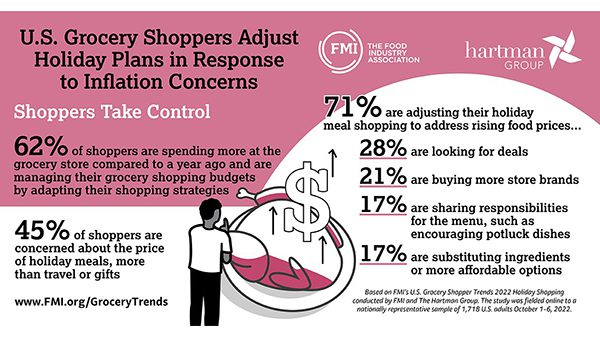October 20, 2022 ARLINGTON, Va.–(BUSINESS WIRE)–FMI—The Food Industry Association BB #:162464 released Part VI of its U.S. Grocery Shopping Trends 2022 series, titled “Holiday Shopping.”
The final release from the expansive survey of food shoppers’ journeys explores the sentiment and behaviors of consumers as they head into the holiday season.
This year, typical holiday stress is exacerbated by inflationary concerns, with 62% of shoppers reporting their grocery costs have increased year-over-year. Despite inflation-induced concerns, average weekly household grocery spending is currently at $148 per week, which is down from the $161 peak during the height of the COVID-19 pandemic.
Heading into the holiday season, 45% of consumers report being most concerned about rising meal prices as compared to other holiday expenses. Fortunately, most shoppers indicate they are in control of their grocery budgets, with 71% of consumers making some adjustment to their holiday meal shopping to adapt to the changing economic landscape. This indicates that shoppers are still able to find budget-friendly items to meet their needs.
To mitigate increased costs, consumers say they are:
- Looking for deals (28%).
- Choosing store brands (21%).
- Enjoying more homecooked meals (20%).
- Making fewer dishes overall (17%).
- Substituting more affordable options (17%).
- Encouraging guests to bring dishes (17%).
- Spending less in other categories to provide holiday meals (17%).
“Food is the centerpiece for so many of our holiday gatherings. Despite inflationary pressures, consumers are determined to enjoy the festivities this year as they normally do,” said Leslie Sarasin, president and CEO of FMI. “The food industry is working tirelessly to keep costs down and to ensure that our timeless traditions can continue during this holiday season.”
Shortages were a hallmark of the pandemic across many industries, but progress made by food retailers and suppliers to curb widespread supply chain issues has kept consumer confidence up heading into the holidays. Only 27% of consumers report being “very concerned” about food items needed for holiday meals being out of stock.
Shoppers are resilient and if they run into stock issues when holiday food shopping, 50% report they would try something new, while 36% would look for a new recipe.
ABOUT FMI
As the food industry association, FMI works with and on behalf of the entire industry to advance a safer, healthier and more efficient consumer food supply chain. www.FMI.org
ABOUT THE REPORT
The FMI U.S. Grocery Shopping Trends 2022, conducted with The Hartman Group, taps into the U.S. food shoppers’ journey with consumer survey data and ethnographic research.
Contacts
Heather Garlich | hgarlich@fmi.org



